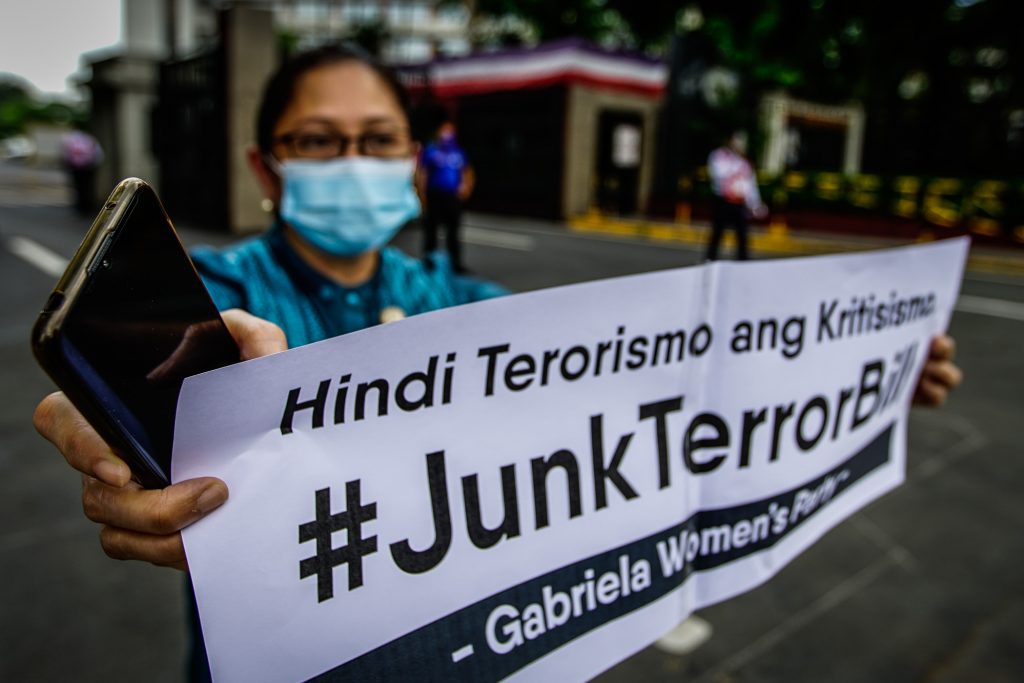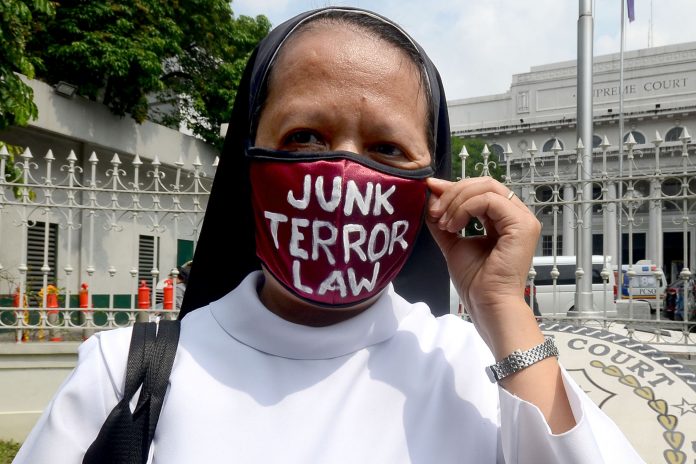Human rights lawyers in the Philippines warned against what they described as “alarming” provisions in the implementing rules and regulations (IRR) of the country’s Anti-Terrorism Act.
Under the law’s IRR, advocacy, protest, and creative, artistic and cultural expressions, among others, can be considered acts of terrorism if these cause death or create a serious risk to public safety.
The Public Interest Law Center (PILC), a lawyers’ group, called on the Supreme Court to act on the petitions filed by various groups against the law following the release of the IRR.
“Every day that passes with this law in place is a day spent in terror and unjustness,” read a statement from the group.
Lawyer Rachel Pastores, PILC managing counsel, said that while the law already wrongfully allows the Anti-Terrorism Council to detain and designate persons suspected of committing vaguely-defined “terror acts,” the IRR made it even worse.
The group raised a concern on the IRR’s Section 9.1, which permits law enforcement and military personnel to arrest suspects and obtain written authorization from the ATC later.
“[This] is like giving the police a blank check where they can list any person they want to arrest,” said Pastores.
“Our opposition to the law remains firmly hinged on the vagueness of the law, its lack of safeguards for the innocent, and its grave violation of constitutional rights,” the group said.
Meanwhile, human rights watchdog Karapatan questioned the “dangerous” power bestowed upon the ATC to publish a list of people it designates as terrorists before giving them a chance to appeal.
The list, which will be published in a newspaper, on the Official Gazette, and on the official website of ATC, shall include the designated person’s name, brief description of the case for designation, and the date of designation or date of last review of designation.
Request for delisting can be done before the ATC within 15 days from the publication of designation.
Grounds for delisting include mistaken identity; relevant and significant change of facts or circumstance; newly-discovered evidence; death of designated person; dissolution or liquidation of designated organizations, associations, or groups of persons; or any other circumstance which would show that the basis for designation no longer exists.

Violators of the law, which repealed the Human Security Act of 2007, will face life imprisonment without the benefits of parole and good conduct time allowance.
Lawyer Edre Olalia, president of the National Union of Peoples’ Lawyers, said the IRR of the law, which has been previously criticized for being too broad, did not clarify the issues.
“As a matter of fact, it was a vain attempt to prettify the law and salvage the infirmities in the law, which is not allowed,” said the human rights lawyer.
“It was a disingenuous way to cure what is already in the law itself,” he added.
With the issuance of the IRR, Olalia expressed fear that the human rights situation in the country could only get worse.
“Even without the implementing rules in the law itself, the red-baiting has been vicious, relentless and incorrigible,” he said.
Karapatan secretary general Cristina Palabay said “terror tagging” has already claimed the lives of peace activists Randy Malayao and Randell Echanis who were included in the list of more than 600 persons that the Department of Justice sought to tag as terrorists under the old Human Security Act of 2007.
Presidential spokesperson Harry Roque Jr. said the law’s critics are free to question the IRR before the Supreme Court.
“In any case, if they think this is a violation of any right, they are welcome to seek relief before the Supreme Court,” he said.
The Anti-Terrorism Act took effect on July 18. At least 37 petitions have already been filed seeking to declare it as unconstitutional.









